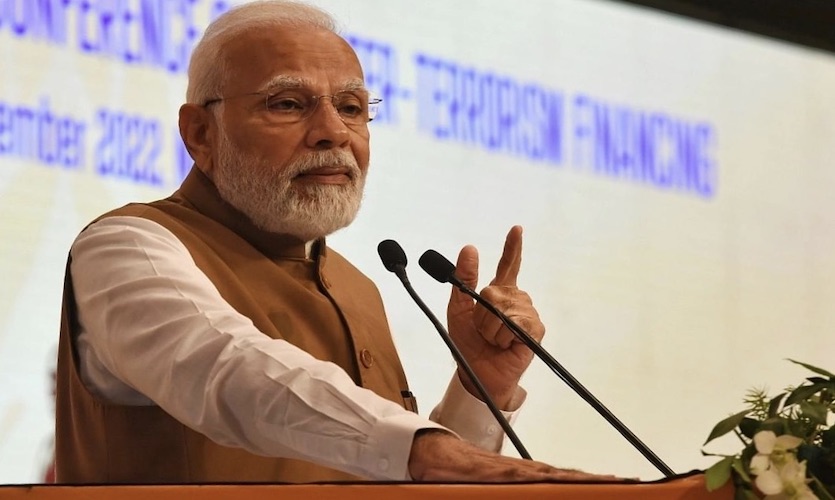On Friday, in his inaugural speech at the No Money for Terror Conference in New Delhi, Prime Minister Narendra Modi said that international organisations must not assume peace is the “absence of war”.
According to the ANI, without singling out Pakistan or China, the prime minister criticised those countries who support terrorism, and said that they provide ideological and financial support to terrorists.
In his speech, PM Modi said:
“It is well known that terrorist organisations get money through several sources – one is state support. Certain countries support terrorism as part of their foreign policy. They offer political, ideological and financial support to them. International organisations must not think that the absence of war means peace. Proxy wars are also dangerous and violent. There must be a cost imposed upon countries that support terrorism. Organisations and individuals that try to create sympathy for terrorists must also be isolated.”
India’s Stance Over Terrorism
The NMT Conference was started by the French government in 2018. In 1989, France had also launched the Financial Action Task Force (FATF), a global organisation dedicated to combating money laundering and terror financing. As with the FATF, which initially focused only on money laundering but expanded to include terror financing after 9/11, the NMT Conference is necessary because the Islamic State and Al Qaeda continue to operate despite territorial defeats in Syria, Iraq and Afghanistan, respectively.
This conference is largely focused on India’s “zero tolerance approach” to terrorism, and it has attempted to draw attention to cross-border terrorism from Pakistan. The Indian delegation called for a united global campaign against all those who support terrorism or help generate money for it. India emphasised the completion of the ‘Comprehensive Convention on International Terrorism’ under the UN, as well as the effective enforcement of FATF Standards. Due to its experience with China blocking its efforts to impose sanctions against Pakistan-based terror groups, India has called for maintaining a non-political approach to UN listings and FATF. Additionally, it has requested a discussion on preventing radicalisation, one of terrorism’s most important prerequisites, titled ‘Countering Financing of Radicalisation (CFR)’.
A major focus of this year’s agenda is on the use of virtual assets and crowdfunding platforms by terrorist entities, their use of the dark web, and the link between terrorist financing and legitimate economic activities. The Indian Express reported that India will discuss the misuse of non-profit organisations, non-financial businesses, and hawala networks for terror financing. Additionally, the country will also examine the challenges faced by investigators in the probing of terror financing crimes, the sharing of information across financial intelligence units, and recent trends in fighting terror financing/money laundering.
During his inaugural address, the prime minister stressed the need for a proactive and systematic approach to uprooting terrorism. “Uprooting terrorism needs a larger, proactive, systemic response. If we want our citizens to be safe, we cannot wait until terror comes to our homes. We must pursue terrorists, break their support networks and hit their finances,” he said. In addition, PM Modi said, “Only a unified, uniform and zero-tolerance approach can defeat terrorism.”
“Fighting terrorists and terrorism are two different things. A terrorist is an individual, but terrorism is a network of individuals and organisations. Uprooting terrorism needs a larger proactive response,” he added.
Emphasising that all terrorist attacks should be treated equally in terms of outrage and action, he noted that the extent of the reaction cannot be determined by where they occurred. “We consider that even a single attack is one too many. Even a single life lost is one too many. So, we will not rest till terrorism is uprooted. It is significant that this conference is happening in India. Our country faced horrors of terror long before the world took serious note of it. Over the decades terrorism in different forms tried to hurt India but we’ve fought terrorism bravely,” he stated.
Furthermore, the prime minister stressed the need to strike at the “root of terror financing”. “Nobody likes an area that is constantly under threat. And due to this, the livelihood of people is taken away. It is all the more important that we strike at the root of terror financing,” he said. Calling terrorism an attack on humanity, freedom, and civilisation, he said that in dealing with a global threat, there is no place for an “ambiguous approach”.
“In today’s world, ideally, there should be no need for anyone to remind the world of the dangers of terrorism, however, there are still certain mistaken notions about terrorism in some circles… (but) sometimes, there are indirect arguments made in support of terrorism to block action against terrorists,” added the prime minister.
Read more: Istanbul Explosion Kills Six, President Hints At Terrorist Involvement










